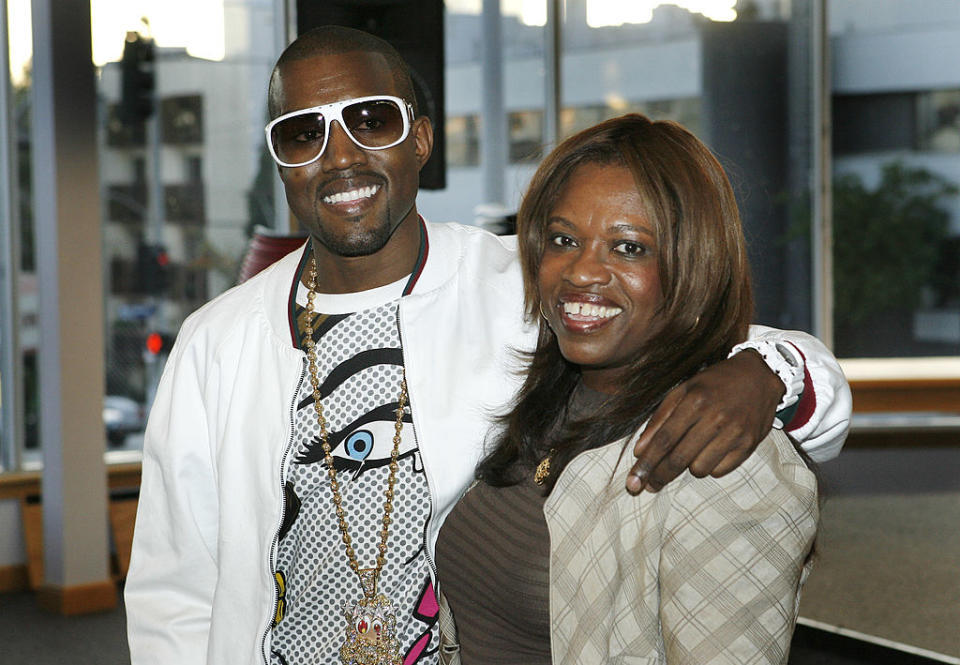We’ve always known that Kanye West was close with his late mother, Donda, who died in 2007. Now, Netflix’s new three-part documentary on the rapper includes a closer look at their loving relationship.
“You play tracks like Michael Jordan shoots free throws,” Donda told him when he visited her at home in the early ’00s. At that point, the young Ye was already an established producer who very much wanted to be a rapper himself.
His mother, who raised Kanye on her own, was so lovingly supportive that she even rapped along with her son in one scene. She knew all the words.
“The main thing is that you get to do something that you really love to do,” she added.
The footage featured in Jeen-Yuhs: A Kanye Trilogy, was captured by co-directors Clarence “Coodie” Simmons and Chike Ozah, who began following Kanye more than 20 years ago. As Coodie explains in the doc, he knew that Kanye would be a star from the time he interviewed him for a public access show in their shared hometown of Chicago in 1998. After Kanye moved to New York City, Coodie saw the first beat that Kanye had ever played for him, Jay-Z’s song “Izzo (H.O.V.A.),” being played on the BET Awards a few years later, and that convinced him to follow him, in order to record a documentary of his breakthrough.
Coodie ended up following the future star for years, capturing candid moments inside the recording studio, in Kanye’s hospital room following the near-fatal 2002 car wreck he wrote about in “Through the Wire” and on a trip back to his childhood home with Donda, who would eventually spend much of her time managing him.
“You know what, Kanye was always self-absorbed in a way,” Donda, a professor, tells the filmmakers, noting that he won all the talent shows he entered as a kid — except for one, in which he lip-synced to Stevie Wonder’s “I Just Called to Say I Love You.”
When Kanye appeared on Def Poetry Jam in 2003, Donda came to see her son and he told him was “so magnificent” and commended him for including his political views. Still, she regularly reminded him to stay humble, despite his great talent.
“It was like the bigger he got, the more he wanted her around,” Coodie says of mother and son’s relationship.
In fact, the directors taped so many sweet moments between the two over the years that, when Donda died of heart disease following cosmetic surgery at 58, her family asked Coodie to compile a tribute video for her funeral.
“I couldn’t imagine the pain that Kanye was feeling,” he said. “Donda was his everything.” However, filming was more sporadic after Ye’s enormous success, and the doc fast forwards through many of his controversies, such as his onstage confrontation of Taylor Swift at the 2009 MTV Video Music Awards, which led to then-President Obama calling him a “jackass,” plus his high-profile marriage to Kim Kardashian and his temporary support of former President Trump. Coodie couldn’t always reach him in the years that followed, but he was concerned from afar, especially after he was hospitalized for stress and exhaustion and placed on a psychiatric hold in November 2016.
“When I heard that Kanye was committed to the hospital, as a friend, I was concerned for his life,” Coodie said. “When I would see Kanye go off in the past, I just thought it was a part of the show. I had no idea he was even struggling with his mental health. For weeks, I did everything I could to get in touch with him, but no one would return my calls.”
“It was difficult watching Kanye on TV, knowing he had issues with his mental health. They were calling him crazy,” Coodie said. “But, to me, it seemed like he was crying out for help. In the past, Kanye might have rubbed folks the wrong way, but, for the first time, it felt like he really lost the people.”
A few months later, a mutual contact helped the co-director reconnect with Kanye. In the following years, he mostly continued to watch the superstar from afar, though he met up with him again from time to time, in the studio or during a recording session. Once in the Dominican Republic, Kanye began a long dialogue and, sensing that the artist wasn’t himself, Coodie turned off the camera.
Then, in July 2020, Kanye entered the race for president, and he broke into tears during a news conference. It was enough to prompt Coodie to check on his friend. Unfortunately, even then, he said he didn’t get a sense of how the artist was really doing. Coodie stated several times throughout the doc that he’s worried about Kanye’s well-being, but he ultimately concluded that all he could do is be there for him when he was able.
The filmmakers decided that the pandemic was the perfect time to put together the documentary, with the bookends of Kanye’s 2004 song “Jesus Walks” and 2019 album Jesus is King, which he released ahead of last year’s Donda and Donda 2. Scheduled to be released Feb. 22, it’ll be Kanye’s 11th studio album.
But there’s no tidy ending, as Kanye’s story is very much still playing out — in addition to the music, there’s his split from Kardashian, his very public pleas to get her back and his swipes at her new boyfriend, Pete Davidson; his own brief romance with Julia Fox; and even his public exchanges with the Jeen-Yuhs directors. He surprised them by calling for editorial control over the project — which he didn’t get — and abruptly insisting that Drake narrate, which didn’t happen. However, Kanye signaled his support when he showed up at the premiere and hugged the men behind the lens.
If Kanye stuck around for all four-plus hours of the show, he would’ve heard Coodie say that each part of his journey with him had been, as the co-director described it, “a new awakening.”
“You might say, you miss the old Kanye. What I’m realizing now is that every part of Kanye makes him who he is,” Coodie said. “Even with everything that’s changed, I still see much of the person I first put my camera on 21 years ago.”
The first part of Jeen-Yuhs: A Kanye Trilogy premieres Wednesday, Feb. 16, with the following episodes arriving Wednesday, Feb. 23, and Wednesday, March 2, on Netflix.




